What Is the Most Unhealthy Energy Drink on the Market?
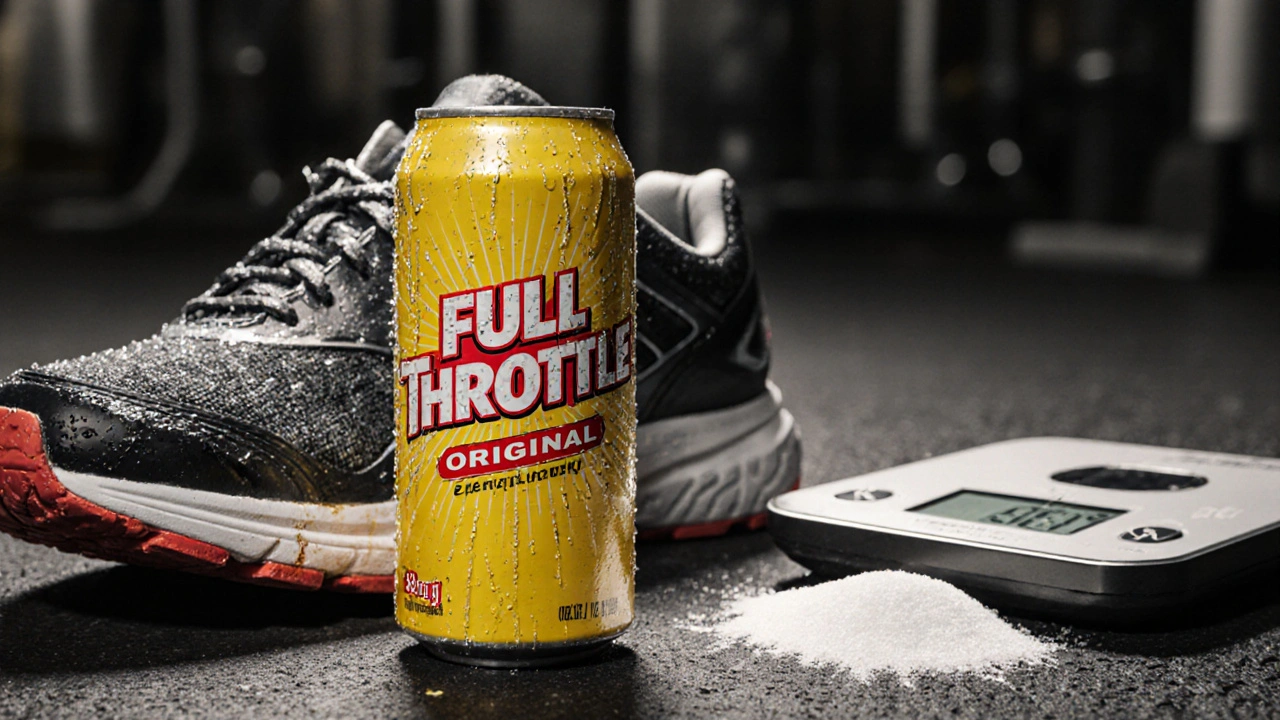
When you’re pushing through a tough workout or racing to hit a personal best, energy drinks feel like a shortcut. But not all of them are created equal. Some give you a quick boost without wrecking your health. Others? They’re basically liquid candy with caffeine. If you’re asking which energy drink is the most unhealthy, the answer isn’t just about caffeine. It’s about what’s hiding in the bottle.
The Worst Offender: Full Throttle Original
Among the dozens of energy drinks sold in Australia and the U.S., Full Throttle Original stands out as the most unhealthy. It packs 220 calories and 58 grams of sugar in a single 16-ounce can. That’s more sugar than a McDonald’s Chocolate Milkshake. And it’s not even the largest can on the market.Let’s break it down. The American Heart Association recommends no more than 36 grams of added sugar per day for men and 25 grams for women. One can of Full Throttle blows past that limit by more than double. And that’s just the sugar. It also contains 160 mg of caffeine - not extreme on its own - but paired with that much sugar, it creates a dangerous combo.
Sugar spikes your blood glucose fast. Your body responds by flooding your system with insulin. Then, within an hour, your energy crashes hard. That’s when you reach for another can. It’s not just fatigue - it’s a cycle. Athletes who rely on this pattern end up with insulin resistance, weight gain, and worse: reduced endurance over time.
Why Sugar Is the Real Problem for Athletes
You might think caffeine is the villain. But caffeine, in moderate doses (under 400 mg), is safe for most adults and even improves focus and reaction time in sports. The real issue? Sugar. And not just because it’s empty calories.When you drink a high-sugar energy drink before or during exercise, your body can’t efficiently use the fuel. Instead of burning fat or stored glycogen, it’s forced to process all that liquid sugar. That slows digestion, causes bloating, and increases the risk of cramps. Elite runners and cyclists avoid sugary drinks for this exact reason. They use electrolyte solutions with under 6% carbohydrate concentration. Full Throttle? It’s nearly 15% sugar by volume.
Studies from the University of Florida’s Sports Science Lab show that athletes who consumed high-sugar energy drinks before endurance events performed worse than those who drank water or low-sugar electrolyte beverages. Their heart rates stayed elevated longer, and they hit fatigue 18% faster.
What Else Is in That Can?
Full Throttle doesn’t just load up on sugar. It also contains:- Guarana extract - a natural source of caffeine, but unregulated. It adds another 20-40 mg of hidden caffeine, pushing total intake close to 200 mg.
- Artificial colors - Red 40 and Yellow 5. These are linked to hyperactivity in children and banned in several European countries.
- Preservatives like sodium benzoate - which can react with vitamin C to form benzene, a known carcinogen, especially when exposed to heat or light.
- No electrolytes - despite being marketed to athletes, it contains zero sodium, potassium, or magnesium. Your muscles need these to recover.
Compare that to a drink like Gatorade Zero or Nuun Sport. They have electrolytes, no sugar, and just enough caffeine (if any) to sharpen focus without the crash. Full Throttle gives you none of the benefits - only the downsides.
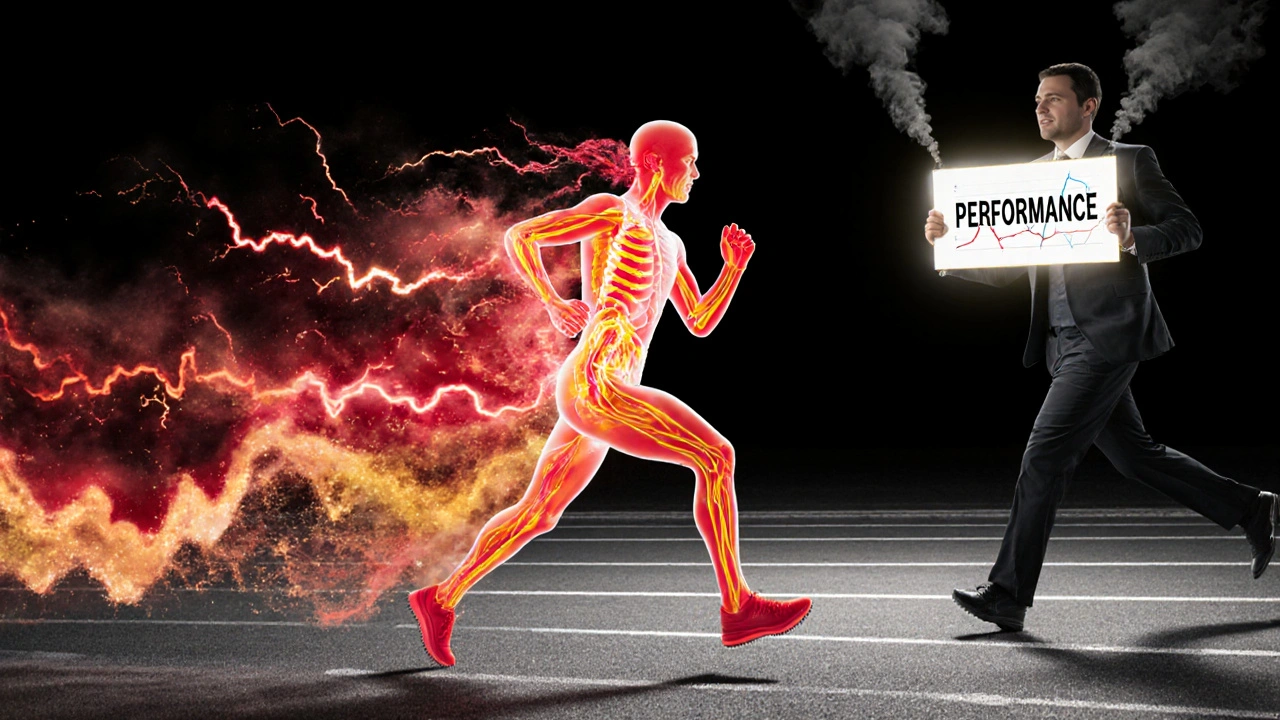
How Energy Drinks Trick Athletes
Marketing plays a big role. Brands slap “energy,” “performance,” and “athletic” on labels and assume you’ll believe it. But the science doesn’t back it up. A 2024 review in the Journal of the International Society of Sports Nutrition found that 78% of energy drinks marketed to athletes contain harmful levels of sugar or untested stimulants.Many athletes think they need the sugar for “quick energy.” But your body already stores enough glycogen for 90 minutes of intense activity. You don’t need a sugary blast - you need steady fuel and hydration. The sugar rush is a placebo with real consequences.
Even worse, some young athletes start drinking these daily. By 16, they’re already developing prediabetes. A 2023 study in the Journal of Adolescent Health tracked 1,200 high school athletes. Those who drank energy drinks three or more times a week were 3.5 times more likely to have elevated fasting blood sugar levels than non-drinkers.
What Should Athletes Drink Instead?
You don’t need a can of chemicals to perform. Here’s what works better:- Water + electrolytes - for workouts under 60 minutes.
- Low-sugar sports drinks - like Skratch Labs Hydration Mix (4g sugar per serving) or Tailwind Nutrition (25g sugar per 24 oz, all from natural sources).
- Black coffee - 150 mg caffeine, zero sugar, no additives. Drink it 30 minutes before training.
- Coconut water - natural potassium, low sugar, hydrating. Choose unsweetened.
- Homemade energy drink - mix 1 cup water, 1/4 tsp salt, 2 tbsp orange juice, 1 tbsp honey, and a squeeze of lemon. It’s cheaper, healthier, and you control every ingredient.
These options give you sustained energy without the crash. No jitters. No bloating. No sugar hangover the next day.
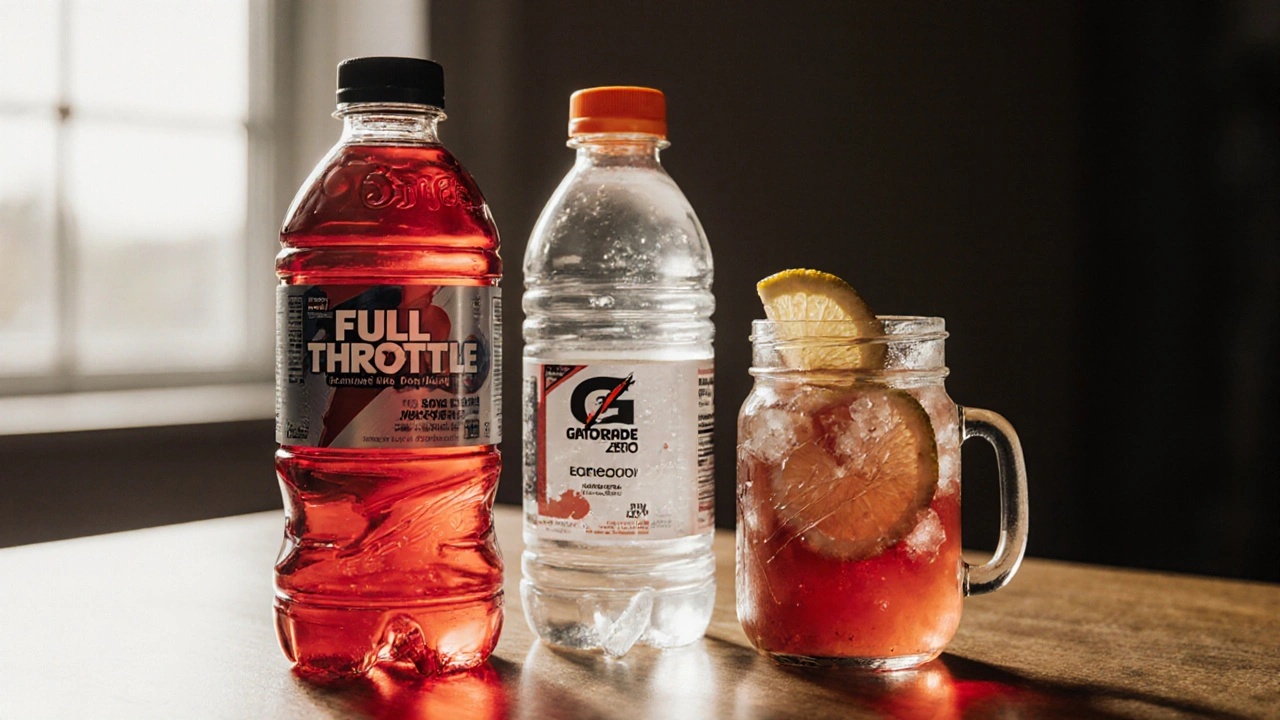
When Is It Okay to Drink Energy Drinks?
There’s one exception: ultra-endurance events lasting more than 4 hours, like marathons or Ironman triathlons. Even then, you need a drink with balanced carbs and electrolytes - not sugar bombs.If you’re racing for 6+ hours and need quick calories, a small amount of sugar (15-20g per hour) can help. But pick a product designed for endurance, like Maurten Gel 100 or SiS GO Electrolyte. Not Full Throttle. Not Monster. Not Rockstar.
For 99% of athletes - from weekend warriors to college teams - energy drinks are a bad habit disguised as performance support.
Bottom Line: Skip the Sugar, Save Your Performance
Full Throttle Original is the most unhealthy energy drink because it combines excessive sugar, hidden stimulants, and zero nutritional value. It doesn’t help you train harder - it just makes you crash harder.Real athletic performance comes from sleep, hydration, balanced meals, and smart fueling - not from a brightly colored can with a logo that screams “extreme.”
If you’re serious about your training, ditch the energy drinks. Your body will thank you - and your times will show it.
Is Red Bull the most unhealthy energy drink?
No, Red Bull is not the most unhealthy. A standard 8.4-ounce can has 27 grams of sugar - still high, but less than half of Full Throttle’s 58 grams. Red Bull also contains B vitamins and taurine, which have some research backing for mild performance support. But it’s still not ideal for athletes. For daily use, it’s better than Full Throttle, but still worse than water or electrolyte drinks.
Can energy drinks damage your heart?
Yes, especially when combined with intense exercise. A 2021 study in the Journal of the American Heart Association found that energy drink consumption before exercise raised blood pressure and heart rate beyond safe levels in 37% of healthy young adults. The sugar-caffeine combo can trigger arrhythmias in people with underlying conditions, even if they’ve never had heart problems before.
Do energy drinks help with muscle recovery?
No. Muscle recovery needs protein, electrolytes, and hydration - not sugar and caffeine. The sugar in energy drinks can actually slow recovery by spiking insulin and promoting inflammation. Drinks with added protein or branched-chain amino acids (BCAAs) are far more effective.
Are sugar-free energy drinks healthier?
They’re better than sugary ones, but not perfect. Sugar-free drinks like Monster Zero or Red Bull Zero use artificial sweeteners like aspartame or sucralose. While these are approved by health agencies, some studies link them to changes in gut bacteria and increased sugar cravings. For athletes, the best choice is still naturally flavored electrolyte drinks with no sweeteners at all.
What’s the safest energy drink for athletes?
There’s no perfect energy drink for athletes. The safest option is no energy drink at all. If you need a boost, try black coffee or a homemade mix of water, salt, citrus, and a touch of honey. If you must buy one, choose a low-sugar electrolyte drink like Nuun Sport or Skratch Labs - they’re designed for performance, not hype.


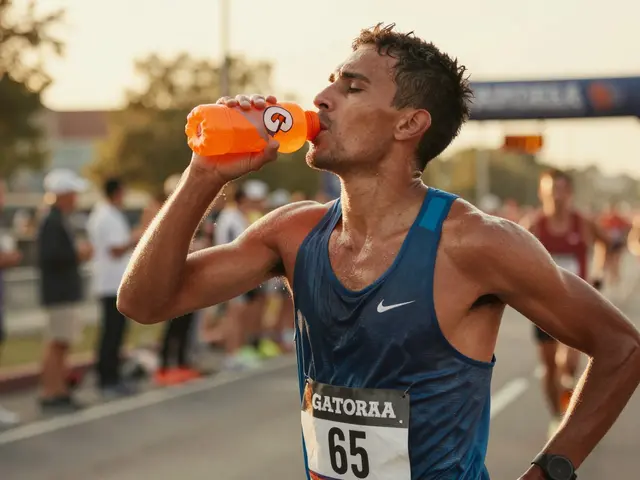
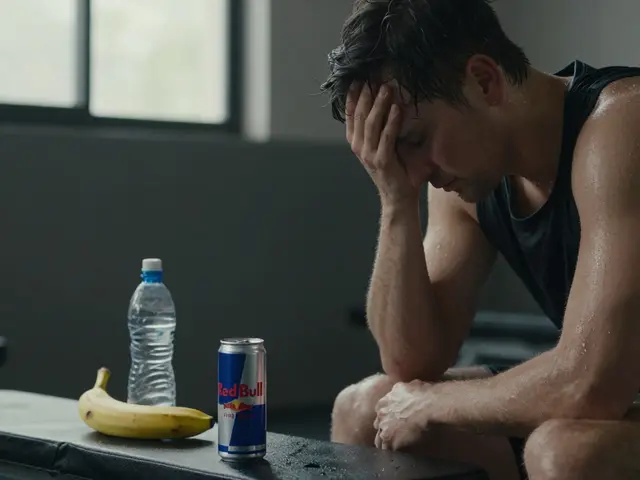
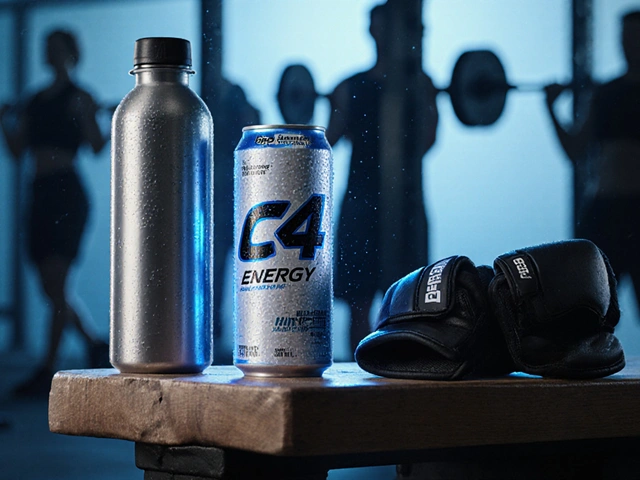

Comments (10)
Sara Escanciano
15 Nov 2025
Full Throttle is a corporate poison pill disguised as a sports drink. They know exactly what they're doing-hook kids on sugar and caffeine so they become lifelong customers. No athlete in their right mind should touch this stuff. This isn't about performance, it's about profit. And the FDA lets them get away with it because lobbying > public health.
Elmer Burgos
16 Nov 2025
honestly i used to drink this stuff before gym back in college and wow what a mistake
felt like a zombie after 20 mins
then i switched to black coffee and water
and my workouts got better
no crash no bloating just steady energy
why make it complicated
Jason Townsend
16 Nov 2025
you think this is the worst wait till you find out what's really in the can
the government knows but they won't tell you
the sugar is just the cover
the real stuff is in the guarana and the preservatives
they're testing on athletes like guinea pigs
and you're drinking it like it's water
wake up
Antwan Holder
17 Nov 2025
we live in a world where a child can buy a can of liquid despair labeled 'energy' and no one bats an eye
we've traded soul for speed
we've replaced nourishment with neon
and we call it progress
Full Throttle isn't a drink
it's a monument to our collective surrender to convenience
your body isn't a battery
it's a temple
and you're offering it up to the sugar gods
Angelina Jefary
17 Nov 2025
you wrote 'a 16-ounce can' but then said '16-ounce' later without the hyphen
and you said 'it contains zero sodium' - that's not grammatically correct
it should be 'it contains no sodium'
and you misspelled 'guarana' as 'guarana' in one spot - it's spelled correctly but you repeated it wrong in the list
fix your grammar before preaching to others
Jennifer Kaiser
18 Nov 2025
I used to be the person who reached for these before every run
thought I needed the boost
turns out I just needed to sleep better and eat real food
the crash isn't just physical
it's emotional
you feel guilty after drinking it
like you betrayed yourself
and that's the worst part
you don't even get better performance
you just get addicted
and then you wonder why you're tired all the time
TIARA SUKMA UTAMA
20 Nov 2025
why do people drink this
it's just sugar
just drink water
done
Jasmine Oey
21 Nov 2025
OMG I JUST REALIZED
Full Throttle is basically the Gatsby of energy drinks
all glitter no substance
it screams 'I'm elite' but it's just a cheap party trick
and the colors? so 2008
like a neon sign in a basement club
my yoga instructor said if you need a drink that looks like a rave, you're already losing
and she's right
real strength is quiet
it doesn't come in a can
Marissa Martin
22 Nov 2025
I tried switching to black coffee after reading this.
It’s been two weeks.
I don’t miss the sugar.
I don’t miss the crash.
I just miss the lie I told myself that I needed it.
Thank you for writing this.
James Winter
24 Nov 2025
you guys are overreacting
in Canada we drink this stuff and we're still the fittest people on earth
you think sugar kills you?
try eating maple syrup on snow
that's 100% sugar
and we're fine
your health panic is weak
drink what you want